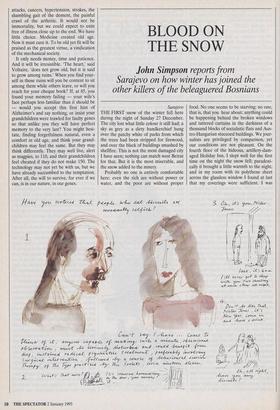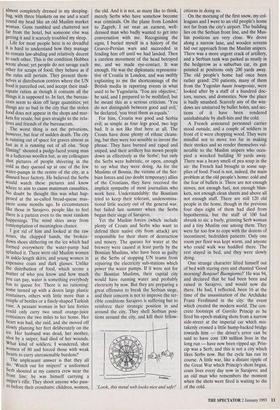BLOOD ON THE SNOW
John Simpson reports from
Sarajevo on how winter has joined the other killers of the beleaguered Bosnians
Sarajevo
THE FIRST snow of the winter fell here during the night of Sunday 27 December. The city lost what little colour it still had; a sky as grey as a dirty handkerchief hung over the patchy white of parks from which the trees had been stripped for firewood, and over the black of buildings smashed by shellfire. This is not the most damaged city I have seen; nothing can match west Beirut for that. But it is the most miserable, and the snow added to the misery.
Probably no one is entirely comfortable here: even the rich are without power or water, and the poor are without proper food. No one seems to be starving; no one, that is, that you hear about: anything could be happening behind the broken windows and tattered curtains in the darkness of a thousand blocks of socialistic flats and Aus- tro-Hungarian stuccoed buildings. We jour- nalists are privileged by comparison, yet our conditions are not pleasant. On the fourth floor of the hideous, artillery-dam- aged Holiday Inn, I slept well for the first time on the night the snow fell; paradoxi- cally it brought a little warmth to the night, and in my room with its polythene sheet across the glassless window I found at last that my coverings were sufficient. I was almost completely dressed in my sleeping- bag, with three blankets on me and a scarf round my head like an old Muslim market woman. Guns rumbled and chattered not far from the hotel, but someone else was getting it and it scarcely troubled my sleep. Life for most people here is so dreadful it is hard to understand how they manage to remain law-abiding and relatively decent to each other. This is the condition Hobbes wrote about; yet people do not savage each other for scraps of food; they behave as if the rules still pertain. They present them- selves at distribution centres where the UN food is parcelled out, and accept their inad- equate ration as though it contains all the things it is supposed to. In fact, the bureau- crats seem to skim off large quantities; yet things are so bad in the city that the stolen food does not appear in the shops and mar- kets for resale, but goes straight to the rela- tives and friends of the bureaucrats.
The worst thing is not the privations, however, but fear of sudden death. The city IS running out of space for graves almost as fast as it is running out of all else. 'Stop
shouted a pudgy-faced young man in a ludicrous woollen hat, as my colleagues shot pictures of people shivering in the cold as they queued up at one of the few water-pumps in the centre of the city, at a disused beer factory. He believed the Serbs would watch these pictures and know where to aim to cause maximum casualties. No doubt he thought this was what hap- pened at the so-called bread-queue mas- sacre some months ago. In circumstances like those in Sarajevo, people like to feel there is a pattern even to the most random happenings. The mind shies away from contemplation of meaningless chance.
I got rid of him and looked at the raw noses, the chapped hands, the broken- down shoes slithering on the ice which had formed everywhere the water-pump had Splashed it. There were old Muslim women in ankle-length skirts, and young women in expensive coats and dark glasses. Unlike the distribution of food, which seems a matter of who you know and how much You can pay, water is something everybody has to queue for. There is no rationing: some turned up with a dozen large plastic containers, others with little more than a couple of bottles or a finely-shaped Turkish vase. A peasant woman in her late forties could only carry two small orange-juice containers the two miles to her home. Her heart was bad, she said, and she moved off Slowly planting her feet deliberately on the Ice. Her husband was dead, her mother, Shot by a sniper, had died of her wounds. What kind of soldiers, I wondered, shot Women of 80 and forced those with weak hearts to carry unreasonable burdens? The unpleasant answer is that they all do. 'Watch out for snipers!' a uniformed Serb shouted at my camera crew near the front line; he was himself carrying a sniper's rifle. They shoot anyone who pass- es before their crosshairs: children, women, the old. And it is not, as many like to think, merely Serbs who have somehow become war criminals. On the plane from London to Zagreb, I sat near an earnest, well- dressed man who badly wanted to get into conversation with me. Recognising the signs, I buried myself in a history of the Graeco-Persian wars and succeeded in fending him off until we had landed. Then a careless movement of the head betrayed me, and we made eye-contact. It was enough. He was the diplomatic representa- tive of Croatia in London, and was swiftly explaining to me the shortcomings of the British media in reporting events in what used to be Yugoslavia. 'You are objective,' he said, and I prepared to be mollified; but he meant this as a serious criticism. 'You do not distinguish between good and evil,' he declared, 'you treat them as equals.'
For him, Croatia was good and Serbia evil; as simple as four legs good, two legs bad. It is not like that here at all. The Croats have done plenty of ethnic cleans- ing, but they were too sensible to invent the phrase. They have burned and raped and sniped, and their artillery has mown people down as effectively as the Serbs'; but only the Serbs were hubristic, or open, enough to say what they were doing. As for the Muslims of Bosnia, the victims of the Ser- bian forces and (no doubt temporary) allies of the Croatians, they have received the implicit sympathy of most journalists who work here. Understandably: the Bosnians tried to keep their tolerant, undenomina- tional little society out of the general war, but failed last summer when the Serbs began their siege of Sarajevo.
Yet the Muslim forces (which include plenty of Croats and Serbs who want to defend their native city from attack) are responsible for their share of destruction and misery. The queues for water at the brewery were caused at least partly by the Bosnian Muslims, who have been as guilty as the Serbs of stopping UN teams from repairing the electricity sub-stations which power the water pumps. If it were not for the Bosnian Muslims, their capital city would have running water and probably electricity by now. But they are preparing a great offensive to break the Serbian siege, and their concern is not to improve the ter- rible conditions Sarajevo is suffering but to reinforce their strategic position in and around the city. They shell Serbian posi- tions around the city, and kill their fellow- 'Look, this metal web looks nice and safe!' citizens in doing so.
On the morning of the first snow, my col- leagues and I went to an old people's home not far from the city's airport. The building lies on the Serbian front line, and the Mus- lim positions are very close. We drove along a narrow lane, and wooden screens hid our approach from the Muslim snipers. There was a more urgent crack of artillery, and a Serbian tank was parked as neatly in the hedgerow as a suburban car, its gun pointed at positions only 200 yards away. The old people's home had once been rather grand: 250 patients, many of them from the Yugoslav haute bourgeoisie, were looked after by a staff of a hundred doc- tors, nurses, and domestics. Now the place is badly smashed. Scarcely any of the win- dows are unstarred by bullet holes, and sec- tions of it have been rendered uninhabitable by shell-hits and the cold.
A French armoured personnel carrier stood outside, and a couple of soldiers in front of it were chopping wood. They were mindful not to move too far in making their strokes and so render themselves vul- nerable to the Muslim snipers who occu- pied a wrecked building 30 yards away. There was a heavy smell of pea soup in the air: the French had brought in some sup- plies of food. Food is not, indeed, the main problem at the old people's home: cold and the fear of bullets is. There are not enough stOves, not enough fuel, not enough blan- kets, not enough clean sheets and above all not enough staff. There are still 120 old people in the home, though in the previous four days eight of them had died from hypothermia, but the staff of 100 had shrunk to six: a burly, grinning Serb woman and a tiny Muslim one among them. They were far too few to cope with the dozens of incontinent, bedridden patients. Only one room per floor was kept warm, and anyone who could walk was huddled there. The rest stayed in bed, and they were slowly dying.
One strange character lifted himself out of bed with staring eyes and chanted 'Good morning! Bonjour! Buongiornor He was 94, and declared that he had been born and raised in Sarajevo, and would now die there. He had, I reflected, been 16 at the time of the assassination of the Archduke Franz Ferdinand in the city: the event which created the modern world. The con- crete footsteps of Gavrilo Princip as he fired his epoch-making shots from a narrow side-street at the imperial car which mis- takenly crossed a little hump-backed bridge towards him — the driver's error can be said to have cost 100 million lives in the long run — have now been ripped up: Prin- cip was a Serb, and this is not a city which likes Serbs now. But the cycle has run its course. A little war, like a distant ripple of the Great War which Princip's shots began, costs lives every day now in Sarajevo; and an old man who remembers the moment when the shots were fired is waiting to die of the cold.











































 Previous page
Previous page